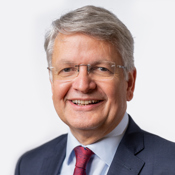If your company does not change tack towards transforming into a sustainable business in time, you will not only run the risk of losing your raison d’être but will also lose out on talented staff, who will not want to work for you. This is what former DSM executive Feike Sijbesma argued at a.s.r. vermogensbeheer’s webinar, where he was a guest speaker. During the webinar, Jack Julicher shared his financial markets outlook for 2021 and, in passing, announced the launch of a new a.s.r. fund...
CCO Boudewijn van Uden opened the webinar yesterday morning with a question for Jack Julicher: whether the outcome of the US presidential elections would have any implications for the financial markets. According to the chairman of the board of a.s.r. beleggingen, Biden and Trump may focus on different issues, but that makes little difference for the US economy. “Volatility will increase due to the uncertainty of the election result, but despite the biggest recession since WWII, financial markets are not in such a different situation than they were 12 months ago, thanks to large-scale intervention by governments and central banks.”
COVID-19 as a game changer
Looking back at 2020, Jack could not ignore the fact that COVID has also been a game changer economically. Despite the minor economic upswing at the end of the summer, the Netherlands will still face its largest post-war budgetary deficit, of 8 percent. “But thanks to the huge state aid packages in both the US and Europe, the impact on vulnerable sectors has been limited so far.”
Jack then shared his views on the outlook for the financial markets in 2021 with the more than 120 participants in the webinar, including both financial experts and journalists from various national media outlets.
The presentation (PDF) can be downloaded at the bottom of this article, and the 2021 outlook film is available via this link.
2021 financial markets outlook
Jack believes that interest rates will remain low for a long time yet, but will nevertheless gradually go up in the long run due to the enormous budgetary deficits. “That is bad for government bonds. But you can see there are differences between various European countries. Ireland, for example, is doing better than Austria.”
The equity market is anticipating economic recovery. Occasionally too much so, in Jack’s view. “It increases the risk of a possible price correction. Property also shows a mixed picture. Residential and rural properties are the stable element. Rural property also provides an opportunity to work on sustainability, for example by improving soil conditions and building solar and wind farms. In retail, it is important to be extremely selective and focus on prime high street retail and prime neighbourhood shopping centres.”
As regards investment in offices, Jack warns that it is important to focus on the 15 percent of offices that are close to major mobility centres. “The enormous growth in remote working will also affect that sector.”
Jack was also positive about the developments in corporate bonds, mortgages and the SME private loan sector. “I can already say that we will soon launch a new fund for private loans (loans that are not traded in the marketplace, ed.).”
Africa
Guest speaker Feike Sijbesma, who, in his 13 years as CEO of DSM, transformed the company from a chemicals giant to a sustainable producer of healthy food, started his presentation with a video. The video showed a mother in a village in Africa pushing her child into Feike’s arms, saying: “You know”.
The message only became clear to him a little later when she added what the situation would be like if he were to return 10 years later. “If your company does not take responsibility for a better world, it will eventually lose its raison d’être.” It was a tremendous ‘journey’ for Feike to convince shareholders that a more sustainable business could also be profitable. “Step by step we sold the operations we didn’t want to be active in any more and acquired companies that did match our vision. The top of the organisation was good at the old game but now had to play a new one. You cannot replace everyone. These are complicated processes, as people and cultures are obstinate things and difficult to change.”
Feike did not budge and eventually succeeded in convincing everyone that returns and being good to the world can most definitely go hand in hand. “Now shareholders are saying that doing good and doing well can go hand in hand. But it was a struggle. You have a vision and don’t know if it will work. I did fear on occasion that I was going to be the shortest-serving CEO of DSM. But I was determined.”
After Feike had answered a few more questions from the audience, he also had a piece of advice for CEOs in general. “You should not only be insightful as a leader but also have a firm grasp of what’s going on around you. This can be achieved by observation. We live in a changing world. Change tack in time. If not, you will lose your raison d’être, as mentioned earlier, and no talented staff will want to work for you.”



